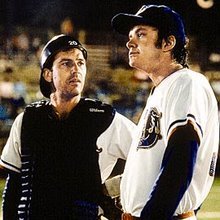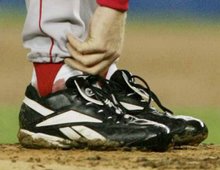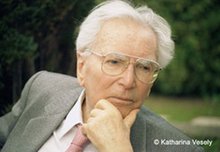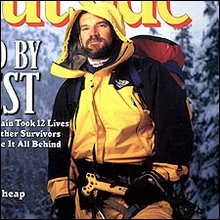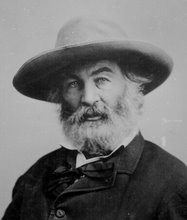THIS IS THE SCHEDULE FOR THE REST OF THE WAY. IGNORE ANYTHING DIFFERENT ON THE ORIGINAL SCHEDULE.
The classes of week 11 – We will begin research and work on it all this week. The article critique is due the last day of the week (Friday) AT THE LATEST no matter what class you come to. This means I would preferably like it earlier, but I will accept it until then. I will also accept all essays that have been due up until then. If you would like a redo, contact me and go through the usual process. If you want to know what you're missing, contact me. Your first class of the week is the last day for all of your journals to be in FOR BONUS POINTS. I'll still accept journals after that, but not for bonus early credit and bonus all perfect credit.
The first class of week 12 – Collect Journal #9 – your choice at the Beginning of Week 12. The rest of the week, we will work on the Aron Ralston video and preparing you to do the online assignment, which will be due by 6am you first class of the next week.
The first class of week 13 – Aron Ralston online peer review Assignment 1st class of week 13 - we will go over this and work on a lot of researching stuff and grammar if time allows.
The first class of week 14 – Collect Journal #10 – being a better writer Beginning of Week 14. We will go over this and work on a lot of researching stuff and grammar if time allows.
The first class of week 15 –We will go over this and work on a lot of researching stuff and grammar if time allows.
The first class of week 16 – Research Paper comes in the 1st class of week 16. There is no redo on this paper as there isn't time to correct it and for you to truly make it better. Do your best the first time. The Pushups Grammar Test is the 3rd to last day of class. The Grammar Test is the 2nd to last day of class.
The first class of week 17 – Essay 1 redone and souped up for the last day of class – your ticket to the final. www.mywritinglab.com must be done today (all undone sections are multiplied times 3 and subtracted from 150 to find your final score). All you do today is the final exam that leaves you finished with COM051. Since you have worked hard, you get to enjoy the rest of the year without any more papers or anything like that to worry about. Congratulations! You’re through with your first semester and you have achieved success. I am very proud of you. If you don’t have a final essay, you will automatically fail this class. Don’t let this happen. This will make both of us sad.
Friday, October 22, 2010
Wednesday, October 20, 2010
Pat Tillman Essay for Mid Term
Tillman Sample Essay
Many people are aware of Pat Tillman, the hero who gave up an NFL career for a life of higher purpose as an Army Ranger. However, very few people know that if it wasn’t for the actions of a single female judge, Tillman might never have been the person that he became in upholding the presence of what it meant to be an honorable American in the wake of 9/11. As a result, Jon Krakauer has written these chapters in Where Men Win Glory to show what is meant by punishment, penance, and redirection in the course of discipline.
The first thing that Krakauer focuses on is that Tillman was a good kid who went horribly wrong. One could say that Tillman went into the fight with the best of intentions when he sought to defend his friend from harm; nevertheless, by beating the tar out of Rosas, he showed an unchecked aggression that should have been controlled. While he quickly realized his error and looked to make up for it, it was abundantly clear that something greater would have to change Tillman’s ways or he might resort to this violent rage the next time he felt a “cause to battle evil.” Thus, it was necessary to have a tough figure enter his life to deliver a message of punishment that would correct Tillman’s ways and not let him feel that he had gotten away with almost murdering someone.
To this challenge, an anonymous female judge entered the picture. Krakauer’s description of her shows that she had built a reputation of delivering messages and doing the right thing. Despite having two attorneys fighting for opposite ends of a possible punishment, it would be her job to render a verdict that would take into account the feelings of the victim and Tillman’s potential for a college football scholarship, which would be otherwise lost if he was given a felony charge for his animosity. In doing this, she realized that the point of punishment is to teach people a lesson that they can learn from rather than to keep them from ever doing anything again, for if Tillman would have lost his potential for scholarship and college, he could have been a career criminal, a ward of state aid, or a victim of the neuroses that creep in when a life fails to reach potential. To the judge, none of these were acceptable when the potential for a future was on the line, so Krakauer expressed how the judge handed out the most severe and non-permanent solution available to her.
Thus, Tillman goes to jail with a misdemeanor assault charge, but he never loses the scholarship to go to Arizona State University. Here, he gets serious about life opportunities. He excels at school. He overcomes his diminutive size and dominates at football to the point where he stars for ASU, and when he finishes his collegiate career, he enters the NFL by getting drafted by the Cardinals. Eventually, he reaches all star status, but suddenly in the aftermath of September 11th, he quits this to pursue higher honor as an elite soldier in Afghanistan. Somewhere in the course of this life he has rebuilt for himself, he learned that the goal of punishment is not to inflict pain, but to create an opportunity for penance. Thus, he never makes the same mistake twice. Instead, Krakauer sees him become a man who is committed to fulfilling his life’s potential.
Thus, it is clear to see that Tillman was “not who he was at his worst moment.” By having someone believe in him, he became something greater to America. Thus, Krakauer’s portrayal of this heroic man succeeds in showing society that if a person understands that to be punished is not a permanent consequence, but instead an opportunity to redeem him or herself, then she / he has truly made amends for their misgivings.
Many people are aware of Pat Tillman, the hero who gave up an NFL career for a life of higher purpose as an Army Ranger. However, very few people know that if it wasn’t for the actions of a single female judge, Tillman might never have been the person that he became in upholding the presence of what it meant to be an honorable American in the wake of 9/11. As a result, Jon Krakauer has written these chapters in Where Men Win Glory to show what is meant by punishment, penance, and redirection in the course of discipline.
The first thing that Krakauer focuses on is that Tillman was a good kid who went horribly wrong. One could say that Tillman went into the fight with the best of intentions when he sought to defend his friend from harm; nevertheless, by beating the tar out of Rosas, he showed an unchecked aggression that should have been controlled. While he quickly realized his error and looked to make up for it, it was abundantly clear that something greater would have to change Tillman’s ways or he might resort to this violent rage the next time he felt a “cause to battle evil.” Thus, it was necessary to have a tough figure enter his life to deliver a message of punishment that would correct Tillman’s ways and not let him feel that he had gotten away with almost murdering someone.
To this challenge, an anonymous female judge entered the picture. Krakauer’s description of her shows that she had built a reputation of delivering messages and doing the right thing. Despite having two attorneys fighting for opposite ends of a possible punishment, it would be her job to render a verdict that would take into account the feelings of the victim and Tillman’s potential for a college football scholarship, which would be otherwise lost if he was given a felony charge for his animosity. In doing this, she realized that the point of punishment is to teach people a lesson that they can learn from rather than to keep them from ever doing anything again, for if Tillman would have lost his potential for scholarship and college, he could have been a career criminal, a ward of state aid, or a victim of the neuroses that creep in when a life fails to reach potential. To the judge, none of these were acceptable when the potential for a future was on the line, so Krakauer expressed how the judge handed out the most severe and non-permanent solution available to her.
Thus, Tillman goes to jail with a misdemeanor assault charge, but he never loses the scholarship to go to Arizona State University. Here, he gets serious about life opportunities. He excels at school. He overcomes his diminutive size and dominates at football to the point where he stars for ASU, and when he finishes his collegiate career, he enters the NFL by getting drafted by the Cardinals. Eventually, he reaches all star status, but suddenly in the aftermath of September 11th, he quits this to pursue higher honor as an elite soldier in Afghanistan. Somewhere in the course of this life he has rebuilt for himself, he learned that the goal of punishment is not to inflict pain, but to create an opportunity for penance. Thus, he never makes the same mistake twice. Instead, Krakauer sees him become a man who is committed to fulfilling his life’s potential.
Thus, it is clear to see that Tillman was “not who he was at his worst moment.” By having someone believe in him, he became something greater to America. Thus, Krakauer’s portrayal of this heroic man succeeds in showing society that if a person understands that to be punished is not a permanent consequence, but instead an opportunity to redeem him or herself, then she / he has truly made amends for their misgivings.
Wednesday, October 13, 2010
Midterm - if you didn't get this e-mail, contact me immediately.
See the attached midterm (if you are seeing this on Angel Online, you will find the article at the bottom of the materials section).
Read chapters 5+6. Don't take notes - just read and look for the one main idea that sumarizes why the author wrote these chapters.
Then re-read and take notes.
REMEMBER, you aren't writing a biography - just a summary. You don't need to tell me everything - just what it means and why the author wrote it.
This is from Jon Krakauer's Where Men Win Glory. Since this is a book, the title needs italicized.
You are allowed to use 1 3x5 note card for notes. However, you shouldn't need to write so much that you need a magnifying glass to see it all.
Write this as if you were writing an in-class article summary. See the attached rules.
You will need to write a standard 5-paragraph setup.
You will have the entire class to do this.
Because of the confusion on the class webpage, there will be extra credit regarding Doris Voitier on the midterm. This will not affect your midterm grade, but it will make up for the fact that you did not take the online quiz. If you want to do this to replace your online quiz grade OR because you didn't do your online quiz, then I will be happy to let you - on the day of the midterm and only that day.
Please keep in mind that the Valeen Schnurr online quiz IS DUE ON MONDAY OR TUESDAY (depending on when your class takes place).
Mid term grade possibilities
1st and foremost, there is no pass or fail scenario on this test - just the final. The midterm is worth 25 points as long as you do not get an F or a down arrow.
However, this is preparation for how you would do on the final and to help you decide whether to withdraw from the class or stay in the class.
A - clearly good and no need to worry.
Up arrow - overall good, but could see some improvements.
Up and down arrow - borderline. Could be ok for the final, but could fail the final. Make improvements immediately.
Down arrow - would most likely fail the final and thus fail the class. Make improvements immediately and / or decide whether to stay in class or withdraw before the last day to withdraw from class.
F - you are in a position where there are too many errors to make up in too little time, and thus, you will fail the class.
Read chapters 5+6. Don't take notes - just read and look for the one main idea that sumarizes why the author wrote these chapters.
Then re-read and take notes.
REMEMBER, you aren't writing a biography - just a summary. You don't need to tell me everything - just what it means and why the author wrote it.
This is from Jon Krakauer's Where Men Win Glory. Since this is a book, the title needs italicized.
You are allowed to use 1 3x5 note card for notes. However, you shouldn't need to write so much that you need a magnifying glass to see it all.
Write this as if you were writing an in-class article summary. See the attached rules.
You will need to write a standard 5-paragraph setup.
You will have the entire class to do this.
Because of the confusion on the class webpage, there will be extra credit regarding Doris Voitier on the midterm. This will not affect your midterm grade, but it will make up for the fact that you did not take the online quiz. If you want to do this to replace your online quiz grade OR because you didn't do your online quiz, then I will be happy to let you - on the day of the midterm and only that day.
Please keep in mind that the Valeen Schnurr online quiz IS DUE ON MONDAY OR TUESDAY (depending on when your class takes place).
Mid term grade possibilities
1st and foremost, there is no pass or fail scenario on this test - just the final. The midterm is worth 25 points as long as you do not get an F or a down arrow.
However, this is preparation for how you would do on the final and to help you decide whether to withdraw from the class or stay in the class.
A - clearly good and no need to worry.
Up arrow - overall good, but could see some improvements.
Up and down arrow - borderline. Could be ok for the final, but could fail the final. Make improvements immediately.
Down arrow - would most likely fail the final and thus fail the class. Make improvements immediately and / or decide whether to stay in class or withdraw before the last day to withdraw from class.
F - you are in a position where there are too many errors to make up in too little time, and thus, you will fail the class.
Subscribe to:
Comments (Atom)









